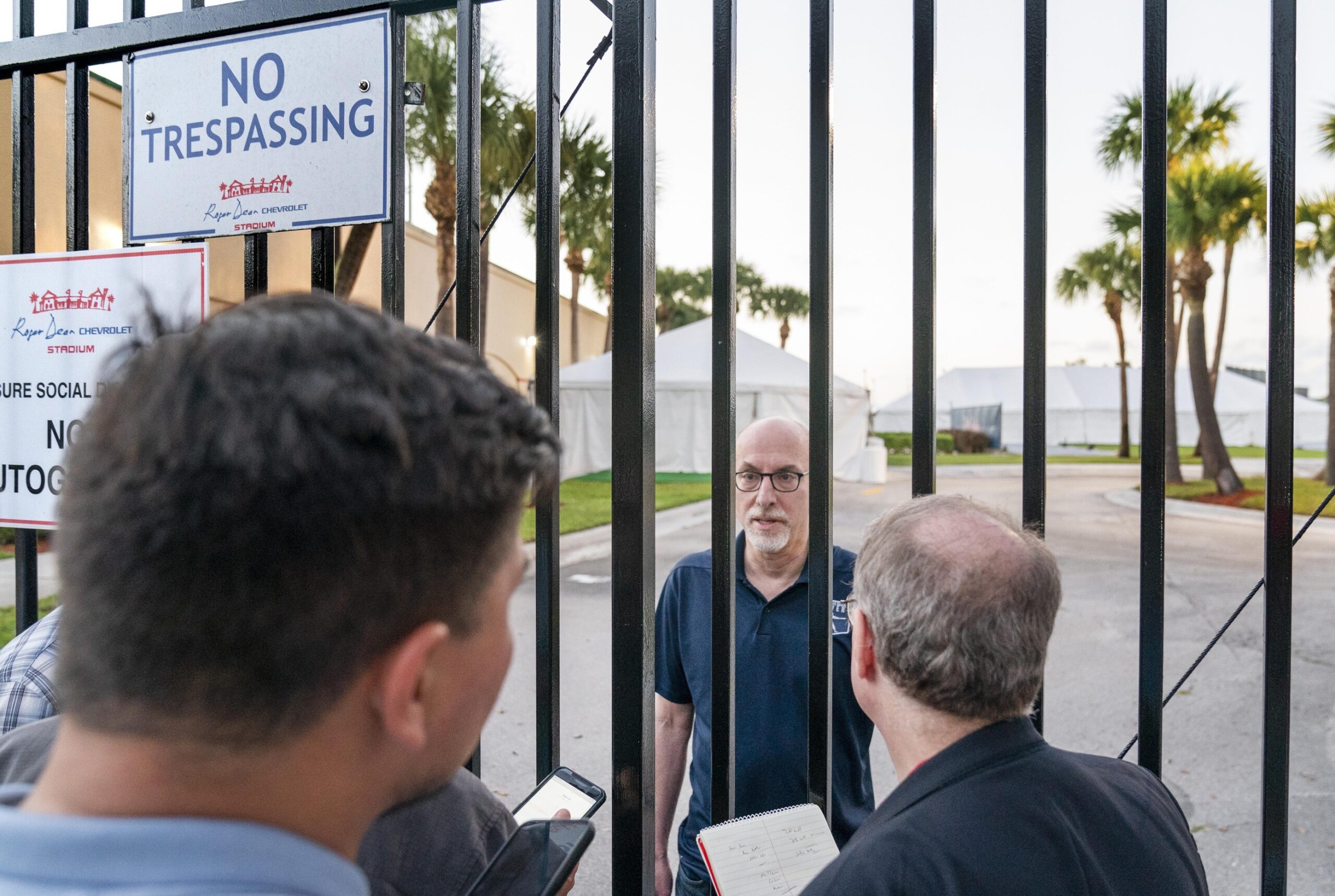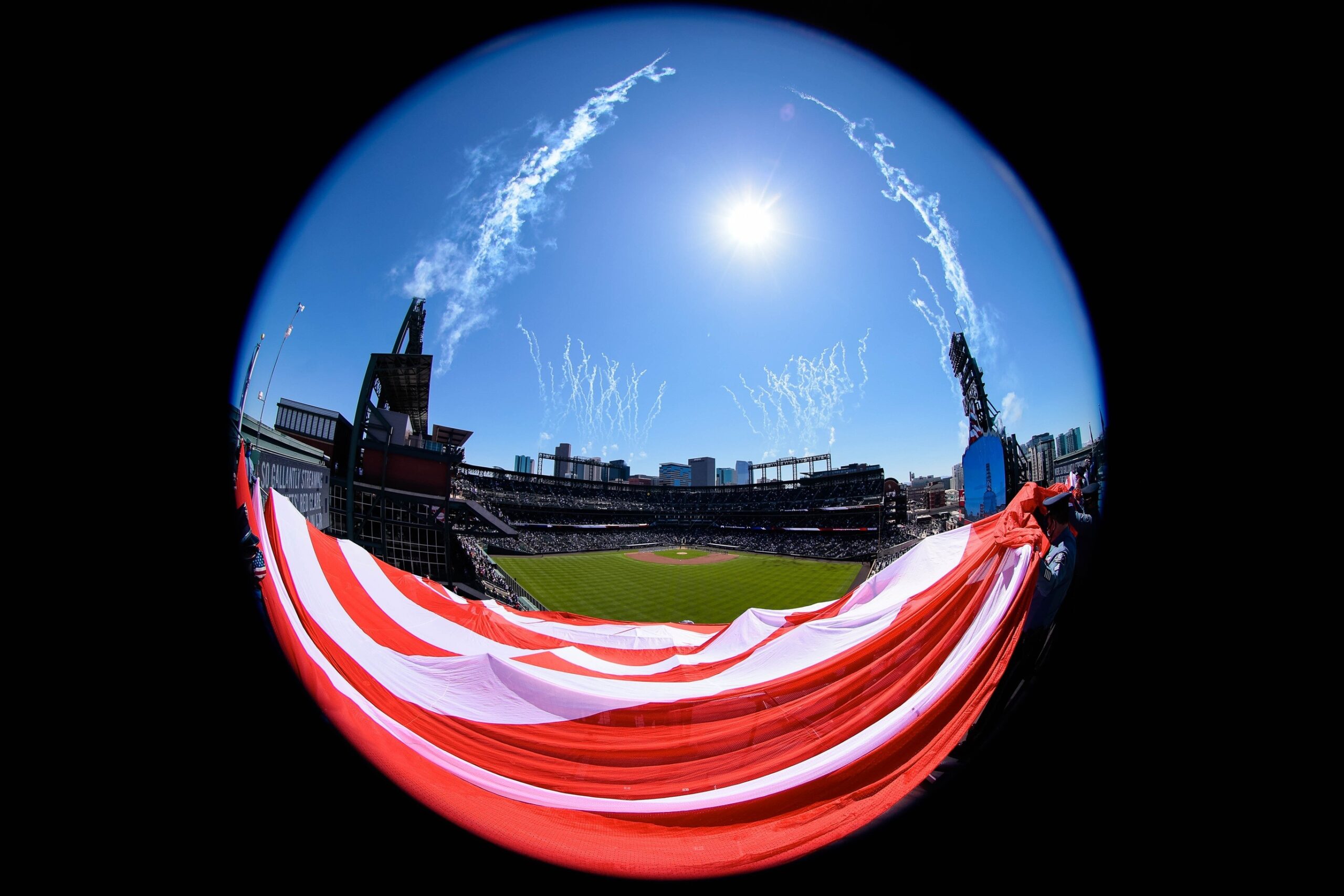© 2025 ALLCITY Network Inc.
All rights reserved.

Beat reporters Patrick Lyons of DNVR Rockies and Jesse Friedman of PHNX Diamondbacks meet on the corner of their respective states for a discussion of the latest news in the world of baseball.
After a week of long but largely unproductive meetings between Major League Baseball and the MLB Players’ Association, baseball fans are beginning to wonder if Opening Day will happen on March 31 as scheduled — or any time in April, for that matter.
After the expiration of the previous collective bargaining agreement (CBA), Major League Baseball – the owners – locked out the MLB Players’ Association in what was described as a “defensive” maneuver by Commissioner Rob Manfred.
Despite the owners not making their first proposal until 43 days into the lockout, there has been little flexibility on their part for fixing some of the larger matters at hand such as the core economic issues.
Granted, agreements have been made about instituting the universal DH, a pre-arbitration pool for players with less than three years of service time and a new draft lottery, but the details of the latter two are still being negotiated.
So where do we stand and what does it all mean? Let’s try to set a good example for these two parties and meet in the middle of Denver and Phoenix: on the corner.
What’s the holdup in these negotiations?
Friedman: At this point, what isn’t holding up negotiations? Even peripheral issues such as expanding playoffs, adding a draft lottery and changing international signing mechanics remain unresolved.
That said, the biggest holdups are the competitive balance tax and the bonus pool for pre-arbitration players.
For those who may be unaware, the competitive balance tax (CBT) penalizes teams for spending over a given amount on team payroll. Currently, that threshold is $210 million. Teams that spend more face a significant tax bill — a bill large enough to scare off all but the Dodgers and Padres from exceeding the threshold in 2021 (don’t we love the NL West?).
Currently, the proposed CBT thresholds from each side are separated by $31 million for 2022 and $53 million in the final year of the new deal (2026). What’s worse, those numbers have barely changed nearly three months into the lockout.
On top of that, the league wants to increase tax rates. Yes, you read that right — MLB’s owners are asking to pay higher taxes. Why? First, it gives them an excuse to spend less. Second, it puts more money in the hands of small-market owners, who seem to be doing the majority of the talking on the owners’ side of the table.
The other obstacle is the addition of a bonus pool for pre-arbitration players. Currently, the MLBPA is requesting a bonus pool for $115 million and the league is sitting at $20 million. Again, the sides are in different stratospheres, and neither has shown interest in meaningfully cutting into that gap.

Lyons: While it appears neither side wants to budge from these larger economic issues, the players made some serious moves over the weekend in hope of cementing a deal.
The players are faced with the biggest dilemma as it relates to their goals following losses at the bargaining table in the previous two negotiations.
The two issues for the MLBPA are getting better compensation for younger members of the union and preventing the soft salary cap from becoming a hard one. If teams can’t spend big on free agents, then those with lesser service time need to be fairly compensated.
Representatives from the union initially requested arbitration for 100 percent of players with at least two years of service time before lowering that number several times and settling upon 35%, a mild increase above the current 22 percent. Such a change would mean a difference of roughly 15 more players reaching arbitration.
But MLB hasn’t really been negotiating much, let alone budge an inch, when it comes to the MLBPA’s major issues. Owners want another victory and would love to break the union much like the NHL did during the 2004-05 lockout. (Sadly, it took canceling the season to win that battle.)
If it costs us a few weeks of the regular season, or a few months, there’s a perceived greater good for either side. If it goes so far as to cost us the entire season, well, they’ll find out if fans’ interest in the game was truly a passion or if it was merely a habit.
When will we finally have Opening Day?
Friedman: If you’ve been listening to the PHNX Diamondbacks Podcast, you know I predicted the lockout would end on Jan. 28 with no games lost. I’ve already made a fool of myself, so I’m not going to try again.
At the risk of being unhelpful, I think anything is possible. And yes, that includes the possibility that we will not have Major League Baseball in 2022.
While the two sides are (finally) meeting consistently, neither has moved meaningfully on either of the core issues discussed above. If losing games in April isn’t a big enough incentive to do so, it’s hard to say why the threat of losing games in May would be any different. This is a staring contest and neither side wants to blink first.

Lyons: It appears the oversized American flag, fireworks and flyovers may have to wait for some day in mid-April. Or May. Or June, as crazy it may be to think, such an outcome is plausible.
Both sides appear willing to lose games in order to fight for their cause.
For owners, it would mean missing out on the coldest month of the regular season when the weather can be questionable and children aren’t the usual factor at the ballpark on school nights.
For players, there is something much greater at stake. While a delayed start of the season may mean a loss of about $200,000 per day for player representatives Max Scherzer and Gerrit Cole, there’s a willingness to sacrifice for the majority of those in the union: players receiving the league minimum.
Why should we pay attention to this stalemate?
Lyons: The idiom about never wanting to see how the sausage is made has never been more apt for the current situation in baseball.
However, if you have to be more conscious about your diet, the ingredients become more important. And yes, some of you will abstain altogether once discovering what you’ll discover. I can’t say I’d blame you.
Hardcore baseball fans can learn a lot about what goes on behind the scenes and somewhat dictate how their club operates. It may not make your team any better, but you’ll have a better understanding of why they might fail to win their division every year or why the front office makes baffling decisions on a consistent basis.
Friedman: I’m not sure you should, to be honest. If there’s ever been a time where MLB has essentially pleaded with fans to disengage from the sport they love, this is it.
There’s a reason that people on social media are clamoring about canceling their MLB.tv subscriptions before they auto-renew on March 1.
⚠️⚠️⚠️REMINDER ⚠️ ⚠️ ⚠️
Cancel your https://t.co/qKvgVlcupm before it auto renews tomorrow.
— Dieter Kurtenbach (@dieter) February 28, 2022
While the players and owners are technically the only participants in this unsightly skirmish, the fans are the oft-forgotten third party at the negotiating table. Coming off a season characterized by declining TV ratings and a 37-year low in attendance, the sport has put itself in a precarious position.
Remember, the league could drop this lockout ordeal right now and continue negotiations while the season continues as normal. They are the reason we’re not watching spring training games right now, and it would be foolish to assume they’re not going to lose fans as a result.
Can anything good come of this?
Friedman: The best version of baseball has the interests of owners and players held in fair balance. That hasn’t been the case for some time, with owners dominating the last several CBA negotiations.
I’d argue that the restoration of player interests is good for the sport. It’s just a shame that has taken us to this point, where fans are restless, angry and cornered into wondering if baseball is really the sport for them.
Lyons: No. Absolutely not.
College baseball and the minor leagues will definitely have more baseball-loving eyes on their product as fans of the game search to fill the void somehow. At the end of the day, we want to root for one very specific club in MLB. Please, just let us do that again.
Comments
Share your thoughts
Join the conversation



